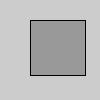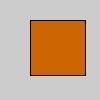fill()#
Sets the color used to fill shapes.
Examples#

def setup():
py5.fill(153)
py5.rect(30, 20, 55, 55)

def setup():
py5.fill(204, 102, 0)
py5.rect(30, 20, 55, 55)
Description#
Sets the color used to fill shapes. For example, if you run fill(204, 102, 0), all subsequent shapes will be filled with orange. This color is either specified in terms of the RGB or HSB color depending on the current color_mode(). The default color space is RGB, with each value in the range from 0 to 255.
When using hexadecimal notation to specify a color, use “0x” before the values (e.g., 0xFFCCFFAA). The hexadecimal value must be specified with eight characters; the first two characters define the alpha component, and the remainder define the red, green, and blue components.
When using web color notation to specify a color, create a string beginning with the “#” character followed by three, four, six, or eight characters. The example colors "#D93" and "#DD9933" specify red, green, and blue values (in that order) for the color and assume the color has no transparency. The example colors "#D93F" and "#DD9933FF" specify red, green, blue, and alpha values (in that order) for the color. Notice that in web color notation the alpha channel is last, which is consistent with CSS colors, and in hexadecimal notation the alpha channel is first, which is consistent with Processing color values.
The value for the “gray” parameter must be less than or equal to the current maximum value as specified by color_mode(). The default maximum value is 255.
To change the color of an image or a texture, use tint().
This method has additional color functionality that is not reflected in the method’s signatures. For example, you can pass the name of a color (e.g. “green”, “mediumpurple”, etc). Look at the online “All About Colors” Python Ecosystem Integration tutorial for more information.
Underlying Processing method: fill
Signatures#
fill(
gray: float, # number specifying value between white and black
/,
) -> None
fill(
gray: float, # number specifying value between white and black
alpha: float, # opacity of the fill
/,
) -> None
fill(
rgb: int, # color variable or hex value
/,
) -> None
fill(
rgb: int, # color variable or hex value
alpha: float, # opacity of the fill
/,
) -> None
fill(
v1: float, # red or hue value (depending on current color mode)
v2: float, # green or saturation value (depending on current color mode)
v3: float, # blue or brightness value (depending on current color mode)
/,
) -> None
fill(
v1: float, # red or hue value (depending on current color mode)
v2: float, # green or saturation value (depending on current color mode)
v3: float, # blue or brightness value (depending on current color mode)
alpha: float, # opacity of the fill
/,
) -> None
Updated on December 25, 2023 16:36:33pm UTC
